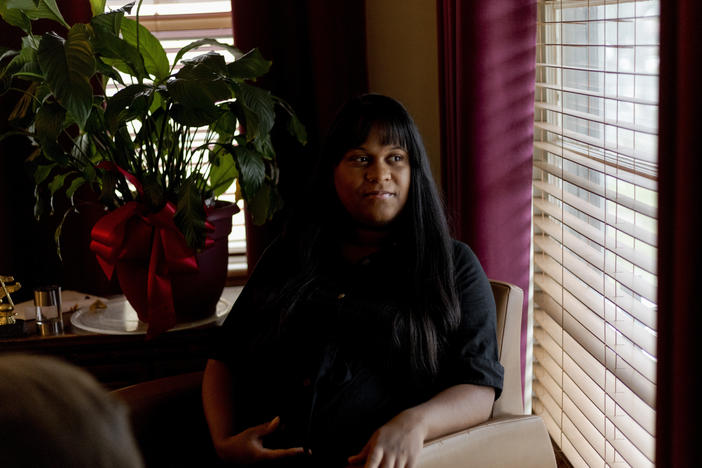Section Branding
Header Content
The state of the — surprisingly resilient — economy
Primary Content
At the start of the year, economists were warning the U.S. was likely headed for a recession, but the U.S. economy has proven remarkably resilient. So what gives?
Transcript
AILSA CHANG, HOST:
If you're confused about the economy, you are not the only one. When the year started, many economists were predicting that the U.S. was headed for a recession. But that isn't how it turned out, at least not so far. More than halfway through the year, the economy has proven pretty resilient, so what's going on? Well, NPR's Scott Horsley and David Gura have been trying to figure that out, and they join us now. Hey, guys.
DAVID GURA, BYLINE: Hey, Ailsa.
SCOTT HORSLEY, BYLINE: Good to be with you.
CHANG: So, Scott, I want to start with you 'cause I know that you've been closely following some of the most recent economic reports. What are they showing exactly?
HORSLEY: Well, you know, Ailsa, for a lot of the last two years, inflation has been this dark cloud hanging over our economy, but we're starting to see some patches of blue sky. You know, annual inflation in June was just 3%, down from more than 9% a year ago - still not where we want to be but on the way. And so far, that improvement has come at the expense of very little pain in the job market.
CHANG: Yeah.
HORSLEY: Unemployment's still close to a 50-year low. The economy is still adding a couple hundred thousand jobs every month. Wages are going up. In fact, wage gains are now going up faster than prices, so workers can actually buy more with their paychecks. All of this is pretty encouraging, and it suggests there might be a wider path to that much sought-after soft landing - that is, lower inflation without a big recession - than it might have looked like six months ago.
GURA: Just to jump in here about that path and how long we have been circling, kind of wondering what that landing is going to be like - I was in North Carolina a couple weeks back at a dinner for one of our member stations. Shout-out to WUNC...
CHANG: Woo-hoo (ph).
GURA: ...My hometown station. And when they were serving dessert, I did a little Q&A, and a listener raised his hand and had a three-word question for me. He said, where's the recession?
CHANG: I mean, that's a great question. We were all freaking out about this months ago. What happened?
GURA: Exactly.
HORSLEY: Was he disappointed that it had not shown up, or was he suggesting that we'd been fearmongering all this time?
GURA: Scott, I could sense he was frustrated. But the cake, by the way, was delicious at that dinner.
CHANG: Yum. OK. Well, I mean, David, I have noticed that the markets have been doing pretty well. Is that because we're seeing more hope about the economy?
GURA: Yeah, there's a lot more optimism about the U.S. economy because of everything that Scott just mentioned. So much of the data seems to be heading in the right direction. I also think, you know, there's this sense of relief on Wall Street given all that we've been through since the start of this year, Ailsa. There were those bank failures. Then on the heels of that, the U.S. came extremely close to defaulting on its debt for the first time ever.
CHANG: Right. There was all this drama over raising or suspending the debt ceiling.
GURA: Yeah. While all of that was going on - that fight, those bank failures - the Federal Reserve was hiking rates at this breakneck pace with the goal of getting high inflation under control, so it was a lot.
CHANG: Yes.
GURA: But now there's a lot less doom and gloom. All three major indexes - the Dow, the Nasdaq, the S&P 500 - are in bull markets. And as the CEO of Wells Fargo said this week on a call with investors, the U.S. economy continues to perform better than many expected.
CHANG: And then on top of that, we're seeing some of the largest companies report these really great earnings. Like, are CEOs feeling pretty optimistic right now?
GURA: Yeah. That word that you used at the top, resilient, is coming up over and over again when business leaders describe the U.S. economy. It's replaced another R-word we've been hearing an awful lot, and that's recession, of course.
CHANG: Right.
GURA: We've seen a number of economists updating their forecasts. Now, Goldman Sachs has been of the belief for a really long time now the Federal Reserve will be able to get inflation under control without triggering a recession. That's made Goldman an outlier. This week it made an even more bullish call. It put the odds of a recession at 20%. That is a very low probability relative to what Goldman's competitors are saying. Here's Jan Hatzius. He's the firm's chief economist.
(SOUNDBITE OF ARCHIVED RECORDING)
JAN HATZIUS: So why are we more optimistic? Main reason is really that, to us, the economy continues to look quite resilient.
CHANG: Why are people so obsessed with the word resilient?
GURA: There it is again. And something that is driving these revisions is the continued strength of the jobs market. Here's what Jane Fraser said on a call with investors this week. She's the head of Citigroup. That's one of the biggest of the big banks.
(SOUNDBITE OF ARCHIVED RECORDING)
JANE FRASER: In the U.S., the tight labor market keeps pushing the timing of this elusive recession later into this year or 2024.
GURA: Now, like other executives, Fraser talked a lot about the strength of the U.S. consumer. The consumer may be more cautious, she said, but they're still spending.
CHANG: Right. OK, so it seems like the news has been positive so far. So does that mean recession fears have really gone away?
HORSLEY: Not entirely.
CHANG: OK.
HORSLEY: As we said, inflation is still higher than the Fed would like. That's why the central bank is widely expected to raise interest rates next week by another quarter percentage point. And it's possible that the pain that usually goes along with rate hikes like that just hasn't caught up to us yet and that eventually it will. You know, a number of forecasters still believe there could be a recession on the horizon. It's just taking us longer to reach that horizon than they had expected. Certainly, there are parts of the economy that are already feeling a slowdown right now. Manufacturing, for example, has been in a slump for a while. Even though consumers are still spending money, as the Citigroup CEO said, they're spending more on services but less on stuff. So factories, which are in the business of making stuff, are feeling that squeeze.
GURA: You know, there may be more optimism. But among executives, there's also this recognition, I think, that, A, we're not out of the woods yet and, B, there is still a ton of uncertainty. Here's what Elon Musk said on Tesla's earnings call.
(SOUNDBITE OF ARCHIVED RECORDING)
ELON MUSK: One day it seems like the world economy is falling apart, and the next day everything's fine. Like, I don't know what the hell is going on, to be totally frank (laughter). I wish I did.
HORSLEY: Check Twitter, maybe.
(LAUGHTER)
GURA: You know, Jamie Dimon, the head of JPMorgan, said something similar, although a little less colorfully. His counsel to investors is to take a deep breath, noting there are, quote, "a range of outcomes here," and as he put it, we should just "hope for the best."
CHANG: OK. Well, what are some of the things markets are looking at?
GURA: Well, Wall Street is still focused on these updates from public companies. We've only gotten updates from about 10% of them so far, so there's still much more to come. And what I'm listening for, Ailsa, is how companies are approaching the debt that they've taken on - debt a lot of them assumed when interest rates were really low. A crucial question here is, what are they going to do now that the cost of refinancing is so much higher?
CHANG: Yeah.
GURA: And then there's commercial real estate. How big a risk are commercial real estate loans for banks, especially smaller regional banks, given how high interest rates are relative to where they were and given how high office vacancies are?
HORSLEY: And there are other potential speed bumps, too. You know, the extra cash cushion that people had piled up in the early months of the pandemic - that is being whittled away. Once more, the payments on student loans that were suspended during the pandemic are about to start up again. That's going to leave less money in some people's pockets. As we've said, so far, this resilient economy has managed to zigzag its way through this minefield pretty much unscathed, but there could be more challenges just below the surface.
CHANG: That was NPR's Scott Horsley and David Gura. Thanks to both of you.
GURA: Thank you.
HORSLEY: You're welcome. Transcript provided by NPR, Copyright NPR.
Bottom Content



